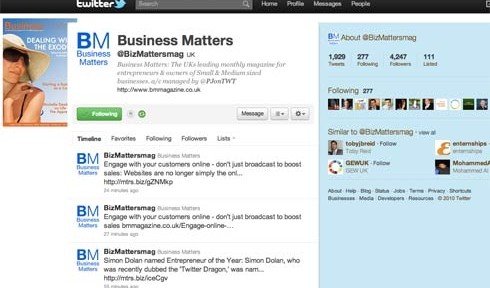It can be tempting for small business owners to jump in at the deep end when it comes to a social media presence, and begin using tools such as Twitter before thinking about how they can have maximum benefit for their business. By giving careful consideration to how the networking site can be most effectively used can help a business develop interaction with their customers and ultimately, help them prosper.
So, just what are the key considerations for a business looking to develop its social media presence on the most prolific of all networking sites: Twitter?
Planning is key – A social media plan enables clear objectives and tactics to be established from the outset on why the business is engaging in social media, which audiences to reach, what messages to convey, and perhaps most importantly who will be responsible.
Build and maintain a following – Small businesses can make the most out of Twitter by building relationships which benefit the company. The best way of doing that is to create good quality content that the target audience wants to read, if in doubt follow these key Tweeting principles: always try to add personality, keep tweets interesting and follow and get involved in hot topics.
Communicate regularly but don’t spam – Tweets should be at frequent intervals (daily at the minimum) so as to keep followers interested in what a business has to say, but an overload of tweets is the same as spam and can end up putting followers off.
Take part in two way dialogue –To be used to its optimum, Twitter should not be treated as a form of one way dialogue. One of its most important functions is the ability it gives businesses to engage in dialogue with current and potential customers to collate important feedback, enhance its brand and subsequently strengthen customer loyalty.
Don’t become swamped – For small businesses that have limited resources, it is all too easy to become overloaded with a barrage of communication that seems impossible to reply to. In this situation consider which followers are most important to respond to and for others think about whether one tweet can respond to a similar question from numerous followers.
Keep a close eye on competitors – Twitter enables small businesses to see what their competitors’ issues are (creating an opportunity), why they are receiving kudos (something to learn from) and what people think of competitors’ latest products (valuable market information).
Showcase expertise – Twitter can be used as a useful tool for keeping at the forefront of the latest industry developments. Businesses can then use the tool as an easy method for communicating on these issues, which in turn showcases the business as an industry expert on the latest hot topics.
Businesses, no matter what their size, should not create a presence on a social media site without giving it the care and attention it both deserves and requires. Those that decide to engage in social media must do so wholeheartedly: a tweet once a week will not suffice. Similarly, communication must be kept open and honest.
Even large corporations don’t always get it right: Nestle recently faced public embarrassment when they asked users of their Facebook page to not use altered versions of Nestle’s logo as their profile picture, otherwise their comments would be deleted. Nestle quickly learned that trying to censor the public in this way would only have a negative effect on their social media presence and ultimately their brand.
A business’ presence on a social media site needs care and attention, but if it is done properly and the basics are covered, the benefits to a business can be substantial.
A case study: How 123-Reg.co.uk uses social media to the benefit of its business
123-Reg.co.uk, the UK´s top domain registrar, recognised the opportunities that social media presented before many of its key competitors. The web hosting group first implemented a social media strategy at the start of 2010 and now has around 5,000 Twitter followers, an active Facebook page and blog.
In the fast-moving domain industry, the ability to act in real time is essential. Social media tools enable 123-Reg to do just that, by actively engaging with customers, listening and responding to feedback; responding promptly and proactively to complaints or bad reviews; and reacting quickly to market changes.
Social media also provides a platform for the web hosting group to utilise its extensive experience of the industry by commenting on the latest trends and issues in the market that are being discussed online.
123-Reg sees its activity on social media as an essential part of its business, so enlists dedicated team members to ensure the company’s social media presence is active, engaging and responsive. The team provides regular updates to other areas of the business (such as sales, customer support and product development).
This ensures its social media presence is correlating to activity throughout the rest of the business, and that useful customer insight is fed back to the relevant team to make sure the company’s products and services are best meeting the wants and needs of its customers.
Thomas Vollrath, CEO of 123-Reg, says, “Social media plays an important role in our business. Perhaps one of the most important functions that social media tools provides us with is the ability to demonstrate a human element to our company. Through our social media activity customers and contacts can clearly see the people behind the corporate persona that is often associated with large businesses: listening, responding and reacting to customer comments, industry news and amusing stories – right here, right now.”
Follow 123-Reg on Twitter – http://twitter.com/123Reg
